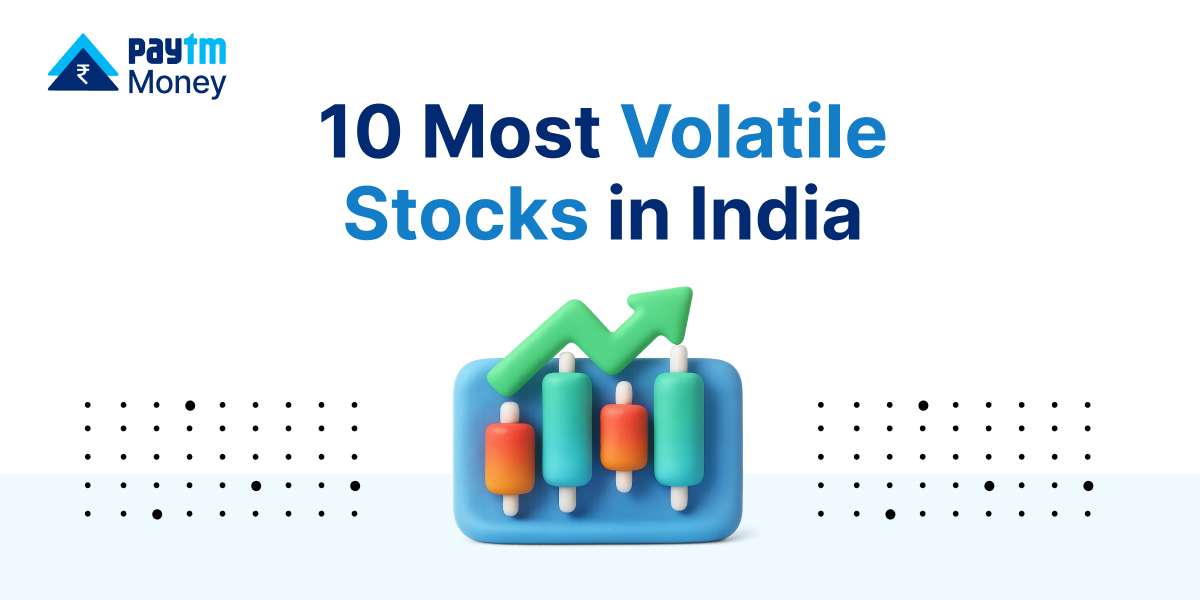Introduction
The Indian stock market is known for its dynamic nature, with some stocks experiencing sharp price swings. Volatility can be a double-edged sword—while it poses risks, it also offers opportunities for investors who can handle the fluctuations. This article explores the 10 most volatile stocks in India, their volatility drivers, and strategies for managing investments in these stocks.
- Introduction
- Adani Enterprises Limited (AEL)
- Tata Motors Limited
- Tata Motors is a leading automobile manufacturer in India with a global presence.
- YES Bank Limited
- Vedanta Limited
- Indian Energy Exchange Limited (IEX)
- Indiabulls Housing Finance Limited
- Bharti Airtel Limited
- Eternal (Zomato) Limited
- SpiceJet Limited
- IRCTC (Indian Railway Catering and Tourism Corporation)
- FAQs: 10 Most Volatile Stocks in India
Adani Enterprises Limited (AEL)
Overview
Adani Enterprises is part of the Adani Group, operating in diverse sectors, including energy, logistics, and mining.
- Market Capitalization: ₹2.7 trillion
- Key Volatility Drivers: Regulatory scrutiny, market speculation, and sector diversification.
Why Adani Enterprises is Volatile
Frequent regulatory challenges and varying market sentiment towards the Adani Group lead to sharp price movements in its stock.
Tata Motors Limited
Overview
Tata Motors is a leading automobile manufacturer in India with a global presence.
- Market Capitalization: ₹2.5 trillion
- Key Volatility Drivers: Global automotive demand, electric vehicle (EV) developments, and raw material costs.
Why Tata Motors is Volatile
Tata Motors’ stock reacts strongly to global automotive trends, demand for EVs, and macroeconomic conditions, leading to price swings.
YES Bank Limited
Overview
YES Bank, once a leading private-sector bank, has seen significant ups and downs recently.
- Market Capitalization: ₹660 billion
- Key Volatility Drivers: Corporate governance issues, asset quality, and investor sentiment.
Why YES Bank is Volatile
Frequent changes in leadership, asset quality concerns, and restructuring efforts make YES Bank’s stock highly sensitive to news and market sentiment.
Vedanta Limited
Overview
Vedanta is a diversified natural resources company interested in zinc, lead, silver, and oil & gas.
- Market Capitalization: ₹1.8 trillion
- Key Volatility Drivers: Commodity price fluctuations, regulatory changes, and global demand.
Why Vedanta is Volatile
Vedanta’s exposure to global commodity markets makes it susceptible to price swings based on international demand and regulatory changes.
Indian Energy Exchange Limited (IEX)
Overview
IEX operates a power trading platform that plays a crucial role in India’s energy sector.
- Market Capitalization: ₹131 billion
- Key Volatility Drivers: Changes in power demand, regulatory policies, and sectoral growth.
Why IEX is Volatile
IEX’s performance is closely tied to India’s energy demand and regulatory landscape, leading to frequent price volatility.
Indiabulls Housing Finance Limited
Overview
Indiabulls Housing Finance is one of India’s leading mortgage lenders.
- Market Capitalization: ₹113 billion
- Key Volatility Drivers: Interest rate changes, real estate market trends, and financial health.
Why Indiabulls Housing Finance is Volatile
The company’s exposure to the real estate sector and sensitivity to interest rate movements make its stock volatile.
Bharti Airtel Limited
Overview
Bharti Airtel is a primary telecommunications service provider in India.
- Market Capitalization: ₹11.41 trillion
- Key Volatility Drivers: Tariff changes, competition, and regulatory actions.
Why Bharti Airtel is Volatile
Bharti Airtel’s stock fluctuates based on changes in tariffs, competition in the telecom sector, and regulatory announcements, making it one of the more volatile stocks in the industry.
Eternal (Zomato) Limited
Overview
Zomato is a leading online food delivery platform in India.
- Market Capitalization: ₹3116 billion
- Key Volatility Drivers: Growth prospects, competition, and profitability concerns.
Why Zomato is Volatile
Zomato’s stock is susceptible to its growth trajectory, competitive pressures, and path to profitability, resulting in frequent price swings.
SpiceJet Limited
Overview
SpiceJet is a low-cost airline in India that competes in the highly volatile aviation sector.
- Market Capitalization: ₹42 billion
- Key Volatility Drivers: Fuel prices, regulatory policies, and travel demand.
Why SpiceJet is Volatile
The airline industry’s sensitivity to fuel price changes, regulatory updates, and travel demand fluctuations makes SpiceJet’s stock highly volatile.
IRCTC (Indian Railway Catering and Tourism Corporation)
Overview
IRCTC handles catering, tourism, and online ticketing for the Indian Railways.
- Market Capitalization: ₹583 billion
- Key Volatility Drivers: Policy changes, tourism trends, and operational updates.
Why IRCTC is Volatile
IRCTC’s stock reacts to government policy changes, tourism sector performance, and significant operational announcements, contributing to its volatility.
FAQs: 10 Most Volatile Stocks in India
What are volatile stocks?
Volatile stocks are shares whose prices fluctuate significantly over short periods. This can be due to market sentiment, earnings reports, industry trends, or broader economic conditions.
Why are some stocks more volatile than others?
Stocks can be more volatile due to factors like smaller market capitalisations, sensitivity to news, industry-specific risks, or the overall market sentiment surrounding the company. For example, companies in sectors like technology or finance may experience more price swings due to their dynamic nature.
How can investors benefit from volatile stocks?
Investors can benefit from volatile stocks by effectively timing their entry and exit points. Volatility offers opportunities for short-term trading profits, although it also involves higher risks. Long-term investors might capitalise on price dips to buy shares at lower prices.
What are the risks associated with investing in volatile stocks?
The primary risk is the potential for significant losses due to sudden and unpredictable price changes. Volatile stocks can be influenced by factors outside an investor’s control, such as market sentiment or unexpected news, leading to substantial price swings.
Are volatile stocks suitable for long-term investment?
Volatile stocks can be part of a long-term investment strategy if the underlying company has strong fundamentals and growth potential. However, investors must be prepared for short-term fluctuations and diversify their portfolios to manage risk.
How do I manage risks when investing in volatile stocks?
Risk management strategies include diversification, setting stop-loss orders, staying informed about market trends, and maintaining a long-term perspective. Investing only what you can afford to lose in highly volatile stocks is also essential.
What role does market sentiment play in stock volatility?
Market sentiment reflects investors’ collective emotions and attitudes towards a stock or market. Positive or negative sentiment can drive stock prices up or down significantly, contributing to volatility. News, economic data, or market trends can influence sentiment.
Why is Adani Enterprises considered one of the most volatile stocks in India?
Adani Enterprises is considered volatile due to its diversified operations across sectors like energy and infrastructure, frequent regulatory scrutiny and market speculation. These factors lead to sharp and unpredictable price movements.
How can I identify a volatile stock before investing?
You can identify a volatile stock by looking at its historical price movements, beta coefficient (a measure of volatility compared to the market), and news flow. Stocks with a high beta, frequent news coverage, and significant price swings are typically more volatile.
Should beginners invest in volatile stocks?
Beginners should approach volatile stocks with caution. While they offer opportunities for significant returns, they also carry higher risks. Beginners should start with less volatile, stable stocks and gradually build experience before venturing into volatile investments.
Disclaimer : Investments in the securities market are subject to market risks, read all the related documents carefully before investing. This content is purely for information purpose only and in no way to be considered as an advice or recommendation. The securities are quoted as an example and not as a recommendation. Paytm Money Ltd SEBI Reg No. Broking – INZ000240532, Depository Participant – IN – DP – 416 – 2019, Depository Participant Number: CDSL – 12088800, NSE (90165), BSE (6707), Regd Office: 136, 1st Floor, Devika Tower, Nehru Place, Delhi – 110019. For complete Terms & Conditions and Disclaimers visit: https://www.paytmmoney.com/stocks/policies/terms.





